100 Film Favorites – #1: UHF
(Jay Levey, 1989)
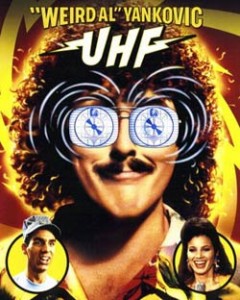 “All you do is make yourself a TV dinner,
“All you do is make yourself a TV dinner,
Press your face right up against the screen,
We’re gonna show you things you ain’t never seen
If you know what we mean.”
Wow. I just typed “#1.” This day has been a long time coming, as I’m sure anyone who’s actually been waiting for it can attest. I was tempted to write the film’s title in all-caps in the spirit of jubilant celebration…but it’s already that way to begin with.
Handing over creative control of a film to an untested talent is a dodgy proposition. Sometimes you end up with Citizen Kane, but more often you don’t. Even when a filmmaker has shown promise previously, putting all the proverbial eggs in one basket by entrusting an individual with an entire movie is risky. After all, George Lucas played a major role in making the original Star Wars a success… but once he was “freed” from the creative input of others, he brought forth the much-reviled prequel trilogy.
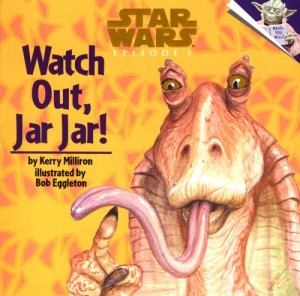 So when floundering studio Orion Pictures looked to “Weird Al” Yankovic to save their financial skin, it was a precarious venture from the start. Though Yankovic had attained considerable success with his comical song parodies, he had never before starred in, much less helmed, a feature-length film. Orion nevertheless saw him as a possible savior: an untested, and therefore fairly cheap, comedian who just might prove a diamond in the rough. If the movie turned out to be a hit, the studio could have a rising star in its stable. And so the struggling movie-house handed the reins of a major motion picture to the man behind “Another One Rides the Bus.”
So when floundering studio Orion Pictures looked to “Weird Al” Yankovic to save their financial skin, it was a precarious venture from the start. Though Yankovic had attained considerable success with his comical song parodies, he had never before starred in, much less helmed, a feature-length film. Orion nevertheless saw him as a possible savior: an untested, and therefore fairly cheap, comedian who just might prove a diamond in the rough. If the movie turned out to be a hit, the studio could have a rising star in its stable. And so the struggling movie-house handed the reins of a major motion picture to the man behind “Another One Rides the Bus.”
As might be expected, the result was kinda weird.
UHF, directed by Al’s manager Jay Levey and co-written by Levey and Yankovic, opens with a sequence that may seem familiar: Three men tromp through a South American jungle. When their leader, a leather-jacketed man seen from behind, pauses to study a map, one of his cohorts turns mutinous and draws a pistol. The leader turns and, with a crack of his trusty bullwhip, disarms his would-be assassin…literally. The whip shears the man’s entire arm from his body. The severed limb falls to the forest floor, and its former owner shambles away through the underbrush, wearing an expression more of surprise than pain.
And the wackiness begins.
We see now that the Indy-analogue is “Weird Al” himself. Though Yankovic’s bristly moustache and coke-bottle glasses stand in stark contrast to Harrison Ford’s rugged countenance, the look isn’t too far off from the Indiana Jones that might have been: in the early stages of Raiders development, Tom Selleck was initially cast as Indy, but had to turn down the role due to his commitment to Magnum, P.I..
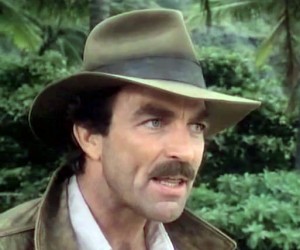 The scene proceeds much the same way as the Raiders opening, but with some twists: When “Jones’s” remaining guide refuses to enter the temple because no one has ever come out alive, he leaves…only to be suddenly flattened by a runaway train. “Jones” shrugs off this bizarre occurrence and continues on. Eventually, he comes to the “golden idol” – an Oscar. Yankovic mimics the memorable moment of tension as Jones carefully weighs the bag of sand against the probable heft of the idol…and then simply throws the bag away and snatches the Oscar from its perch. Sure enough, a huge boulder chases “Indy” toward the temple exit. But it doesn’t stop there. The great stone pursues him past a variety of photo-booth-style backdrops, from snow-swept tundras to a busy city block. Unable to escape, the exhausted “Jones” finally collapses and is flattened (in the commentary, Yankovic claims to still have the rubber, “flat” version of himself hanging on a wall in his house).
The scene proceeds much the same way as the Raiders opening, but with some twists: When “Jones’s” remaining guide refuses to enter the temple because no one has ever come out alive, he leaves…only to be suddenly flattened by a runaway train. “Jones” shrugs off this bizarre occurrence and continues on. Eventually, he comes to the “golden idol” – an Oscar. Yankovic mimics the memorable moment of tension as Jones carefully weighs the bag of sand against the probable heft of the idol…and then simply throws the bag away and snatches the Oscar from its perch. Sure enough, a huge boulder chases “Indy” toward the temple exit. But it doesn’t stop there. The great stone pursues him past a variety of photo-booth-style backdrops, from snow-swept tundras to a busy city block. Unable to escape, the exhausted “Jones” finally collapses and is flattened (in the commentary, Yankovic claims to still have the rubber, “flat” version of himself hanging on a wall in his house).
The image of the thoroughly-squashed “Jones” dissolves to reveal a greasy patty of beef sizzling on a grill. The entire opening has been a daydream, one of many into which protagonist George Newman (Yankovic) finds himself drifting on a daily basis. These fantastic imaginings keep George from holding a steady job. Though his friend and roommate Bob tries to keep George down-to-Earth, the burger-joint gig falls through after a distracted George allows the food to burn to a crisp.
George remains unshaken, insisting, “Someday they’ll be sorry. They’ll be sitting around, eating breakfast or something, and they’ll say, ‘HEY! WE SCREWED UP! We never should have fired George Newman, because HE’S GOT IMAGINATION!”
George’s absent-minded nature causes problems in his personal life as well. His girlfriend, Teri, grows increasingly frustrated by his tendency to lose jobs and miss dates due to losing track of time.
Luckily, the universe soon presents George with a chance to vent some of that pent-up imagination, when Newman’s uncle Harvey wins the deed to U-62, a nearly bankrupt UHF television station, in a hand of poker (UHF, or “Ultra-High Frequency,” was a precursor to cable which allowed viewers access to additional channels through the purchase of a special antenna). At the behest of his wife, Uncle Harvey offers George the position of station manager. Overjoyed, George sets out for the station with Teri. Teri is put off by the dilapidated condition of U-62 headquarters, but George sees only boundless possibilities…at least until he too is weirded out by the sudden appearance of Philo, a mysterious and monotone mad scientist character who lives at the station, maintaining its technical systems.
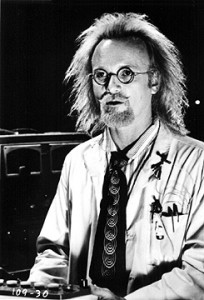
Philo, named for Philo Farnsworth, the inventor of television (also the namesake of Futurama’s Professor Farnsworth).
Over the coming weeks, George does his best to keep the station running smoothly. He brings Bob aboard, and promotes the building’s secretary, Pamela Finkelstein (Fran Drescher), to head reporter for U-62’s news broadcast. He also hires Stanley Spadowski (Michael Richards), a strange but sincere janitor who has just been fired unfairly from his job at Channel 8, the most lucrative and highly-regarded television station in town. Eager for his own chance in the limelight, George creates and hosts the children’s show “Uncle Nutsy’s Clubhouse.”
Historically, UHF stations rarely raked in the dough. These channels tended to air re-runs of older series, and any “original” programming was cheaply produced, in a similar style to Public Access television. And indeed, besides Uncle Nutsy and the news program, U-62’s programming consists mostly of old episodes of Mr. Ed and The Beverly Hillbillies (both shows from the Filmways Productions library, which Orion Pictures had just acquired at the time). Bob, working as the station accountant, deduces that George and co. are hemorrhaging money. U-62, he predicts, will be “flat broke by the end of the month.”
Things only get worse when George, buried in a mountain of paperwork, becomes distracted by an episode of The Beverly Hillbillies and falls asleep (his dream takes the form of a music video for Weird Al’s “Beverly Hillbillies / Money for Nothing”). When Stanley later awakens him, George realizes he has missed Teri’s birthday, as well as an important dinner with her parents. Before he can apologize, Teri calls to dump him. Distraught, George invites Bob to abandon the station and head to a bar, handing off the live taping of Uncle Nutsy’s Clubhouse to Stanley the janitor.
Later, while drowning his sorrows in a blueberry daiquiri (complete with crazy straw), George is astonished to see the bar patrons glued to their television set…and hanging on Stanley’s every word. After recounting a surreal dream in which “I was a bird with a candy-bar head, and all the other birds were trying to eat my head,” Stanley launches into an inspirational speech, based on the “Mad as Hell” speech from the 1976 film Network. Stanley passionately explains how “life is like a mop,” and even when life gets full of “dirt, and bugs, and hairballs and stuff,” you just have to wring it out and keep going, even if it means getting down on your knees and scrubbing the floor with a toothbrush. Stanley’s outburst of janitorial wisdom brings the cheering crowd to its feet, and suddenly George and Bob have a hit on their hands.
Soon, Stanley Spadowski’s Clubhouse is the spectacularly successful tentpole of the new U-62 lineup. Realizing his own forte lies in being an ideas-man rather than a host, George creates a string of other unconventional programs to fill the schedule. Before long, droves of local viewers are tuning in to such fare as Wheel of Fish, a game show hosted by Kuni, the master of a karate dojo next door to Bob & George’s apartment; Philo’s Secrets of the Universe, in which he explains such scientific principles as “making plutonium from common household items”; The Volcano-Worshipers Hour; and Raul’s Wild Kingdom (a show in which an animal-hoarder “teaches poodles to fly” by tossing them from his apartment window). The station’s ratings soar. Not only is Stanley Spadowski’s Clubhouse now the most popular show on the air – Channel 62 is also the top station in town.
This news comes much to the chagrin of R.J. Fletcher, the head honcho at Stanley’s former employer, Channel 8. Fletcher contacts George’s Uncle Harvey, and discovers that Harvey has recently fallen deeply in debt to a gangster after a wager gone wrong. Fletcher offers Harvey $75,000 to cover his debts…in exchange for the deed to Channel 62.
The next day, Fletcher barges into the U-62 office and declares his intention to purchase, and then dismantle, the station (FCC regulations of the day forbade any one person from owning two television channels in the same town). Frantic, George calls Uncle Harvey and, again with the help of Harvey’s wife, implores him to wait a while before finalizing the sale to Fletcher. Harvey has two days until his debt to the gangster comes due, and so he gives George an ultimatum: If George can somehow raise $75,000 in 48 hours, the station will be his.
In yet another flash of inspiration, George initiates the “U-62 Telethon,” a round-the-clock 48-hour pledge drive during which the station will sell Channel 62 stock. If they can sell 7,500 shares at $10 apiece, the station will become a publicly owned company belonging to the community.
At first the Telethon is a great success, with host Stanley’s manic energy inspiring donations from all over town. But when Stanley is kidnapped by a team of Fletcher’s thugs, U-62 is forced to resort to “B-list” performers including an upside-down yodeling guitarist and a stilt-walking Uncle Sam. Donations slow to a trickle.
Philo, who has had the foresight to install spy cameras at Channel 8 headquarters, learns of Stanley’s kidnapping and informs George. Desperate, George sprints off into the night, and the darkness dissolves into another fantasy sequence. Now George is Rambo, braving dangerous jungle and enemy gunfire to rescue his captured comrade (Yankovic sports a heavily-muscled false torso). Rambo-George is impervious to bullets, striding up to Fletcher’s thugs amidst point-blank machine gun blasts and straight-up exploding them with his bow-and-arrow. Eventually, “Rambo” frees Stanley, and the two depart via chopper (a helpful booth offering “Helicopter Rides – $20” stands nearby). Before flying away, they shoot down Fletcher’s own helicopter, then further revel in their destructive power by exploding the Colosseum, the Eiffel Tower, and Hollywood itself.
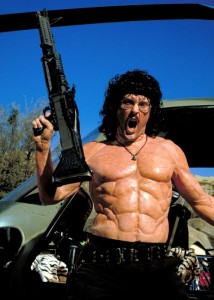 With a guttural roar, the real George bursts into the Channel 8 office, where he introduces himself, in a Stallone-like growl, as the assembled thugs’ “worst nightmare.” One goon cocks an equally real revolver, and George’s imaginary bravado instantly fades. It looks like curtains for George, Stanley, and the Telethon, until the crooks hear a strange noise in the “supplies” closet. They go to investigate, and are quickly dispatched when Kuni and his dojo students burst from the closet with a yell of “SUPPLIES!” (“surprise” in an exaggerated Japanese accent).
With a guttural roar, the real George bursts into the Channel 8 office, where he introduces himself, in a Stallone-like growl, as the assembled thugs’ “worst nightmare.” One goon cocks an equally real revolver, and George’s imaginary bravado instantly fades. It looks like curtains for George, Stanley, and the Telethon, until the crooks hear a strange noise in the “supplies” closet. They go to investigate, and are quickly dispatched when Kuni and his dojo students burst from the closet with a yell of “SUPPLIES!” (“surprise” in an exaggerated Japanese accent).
Kuni and crew escort George and Stanley back to the station, where they are met by throngs of cheering fans. The Telethon gets underway once more, with Stanley delivering an incendiary speech condemning Channel 8 in which he claims to have “looked the potato of injustice right in the eye.” Pledges to the station pick up speed, but it may be too late. U-62’s 48 hours are up, and they have raised only $73,000 of the $75,000 goal. In a moment filled with grim anticipation, the gangster arrives to take the money from Uncle Harvey, Harvey arrives to take the money from Fletcher, and Fletcher arrives to gloat.
But the gloating doesn’t last long. Unbeknownst to Fletcher, Philo’s spy cameras captured a slew of derogatory comments Fletcher directed toward his audience of “mindless sheep” behind closed doors. During Stanley’s kidnapping kerfuffle, Philo overrode the Channel 8 signal and used Fletcher’s own network to broadcast the tape, letting his viewers know what Fletcher really thinks of them. In view of these events, an inspector from the FCC revokes Channel 8’s license to broadcast.
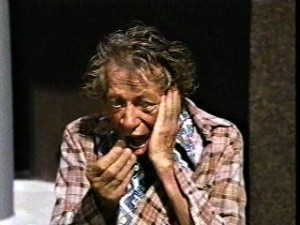 Then, in a final twist of fate, a homeless man whom Fletcher had earlier attempted to insult with a donation of a single penny approaches George, Harvey, and the increasingly impatient gangster. The bum, an avid numismatist, explains that Fletcher’s donation was in fact a 1955 “double-die” penny – an anomaly worth a fortune. Well, a small fortune, anyway. Even after buying a Rolex watch, he has enough left over to buy “a whole buncha shares”: specifically, $2,000 worth. To Fletcher’s great dismay, George pays off the gangster, Harvey signs over the station, and the Telethon tally board ticks up to $75,000, spraying a fountain of celebratory fireworks into the sky. The crowd erupts in triumphant applause, and a bawling Fletcher sadly accepts a consoling hug from the bum.
Then, in a final twist of fate, a homeless man whom Fletcher had earlier attempted to insult with a donation of a single penny approaches George, Harvey, and the increasingly impatient gangster. The bum, an avid numismatist, explains that Fletcher’s donation was in fact a 1955 “double-die” penny – an anomaly worth a fortune. Well, a small fortune, anyway. Even after buying a Rolex watch, he has enough left over to buy “a whole buncha shares”: specifically, $2,000 worth. To Fletcher’s great dismay, George pays off the gangster, Harvey signs over the station, and the Telethon tally board ticks up to $75,000, spraying a fountain of celebratory fireworks into the sky. The crowd erupts in triumphant applause, and a bawling Fletcher sadly accepts a consoling hug from the bum.
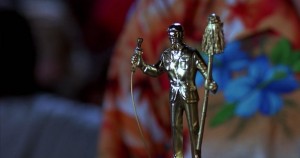
In celebration of their victory, George presents Stanley with a trophy proclaiming him “World’s Greatest Janitor & TV Star”
As the film comes to a close, George makes amends with Teri, who witnessed both Fletcher’s inflammatory remarks and George’s impressive undertaking in galvanizing the community and saving the station. But if they’re going to get back together, Teri has one request:
“You know those dreams you’re always having?” Teri asks.
“Yeah,” replies George.
“Well, do you think maybe sometime, I could be part of them?”
In an instant, the background changes to a sweeping southern vista. George, now decked out as Rhett Butler, assures Teri, in Scarlett O’Hara’s flowing hoop-skirt,
“Baby, from now on you’re gonna be in all of ’em.”
He pulls her in for a cinematic kiss, and the camera slowly pulls back, as the music swells with strains of “Gone With the Wind.” Imagination can make a man an island, but it can also bring a community, and a romance, together.
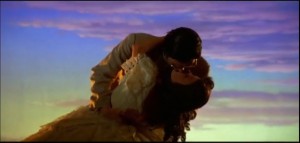 Apparently, test screenings for UHF were some of the most successful in Orion Pictures’ history. As such, Orion regarded Al as a potential star who just might “save the studio.”
Apparently, test screenings for UHF were some of the most successful in Orion Pictures’ history. As such, Orion regarded Al as a potential star who just might “save the studio.”
But then the movie was released to theaters.
The change is best described in Weird Al’s own words: “Every morning I would wake up to fresh strawberries next to my bed. Then, when the movie bombed, I woke up and…no more strawberries!”
UHF was almost universally panned by critics. Siskel and Ebert recalled “not a single laugh” over the course of the film, and Ebert gave the film a one-star review, calling it the “dreariest comedy” of 1989 and “a depressing slog.” The Washington Post wrote that you may find the film funny if you “tend to laugh at anything, such as sudden gusts of wind.”
And critics weren’t the only factor in UHF‘s financial failure. The summer of 1989 saw the release of Tim Burton’s Batman, Back to the Future, Part II, and Indiana Jones and the Last Crusade. And Honey, I Shrunk the Kids. And Ghostbusters II. It was a red-letter time for movies.
Same Thing, right?
So why does a movie derided by critics and buried under a mountain of more prestigious and popular films now stand at #1 atop my Film Favorites Countdown?
Let me put it this way. A friend of mine (despite being an avowed detractor of Weird Al) once told me that HIS favorite movie was The Big Lebowski. He found the film inspiring. It struck a proverbial chord with him. Half-seriously, he said he did what he could to “model his life” around the movie, and the laid-back teachings of the Dude.
Well, I feel the same way about UHF. George Newman begins the story an unappreciated underdog, but he finds a niche for his bizarre creative energies and it allows him to thrive. He harnesses his eccentricity to achieve success – much like Pee-Wee Herman, Napoleon Dynamite, Mr. Bean, or the Uncles in Secondhand Lions – and he and his motley menagerie of misfits rise to become television darlings of the nation.
And that’s a trajectory I’d like to model my life around.
Admittedly, the film isn’t “perfect.” For example, UHF lacks much of the narrative tightness of a movie like The Prestige. The presentation is fragmented, with bouts of commercials for unusual businesses and promos for U-62 programs frequently interrupting the main narrative. But these snippets comprise many of the movie’s most memorable moments, and allow for the best expression of Yankovic’s signature humor, rooted in parody and absurdism. Ads for Spatula City (a super-store where “we sell spatulas, and that’s all!”) and the “Plots R Us Mortuary Service” alternate with previews for shows like “Celebrity Mud-Wrestling, with tonight’s guest, Mikhail Gorbachev” and Town Talk, a Jerry Springer-style program in which George addresses the pressing issues of “Lesbian Nazi hookers, abducted by aliens and forced into weight-loss programs.”
The one major lull in the film is the “Beverly Hillbillies” dream sequence / music video. From what I understand, the studio influenced the decision to include at least one of Weird Al’s signature parody songs in the movie. Initially, a music video for “Bedrock Anthem,” a parody based around The Flintstones, was meant to be included as well, and I’m so glad it wasn’t. The sequence drags on too long and, lacking the charm of the other, shorter non sequitur bits, seems out of place.
But even with its fragmented structure and occasionally uneven pacing, UHF remains an excellent example of just what film can be when an artist dreams up a crazy idea and asks “what if?”. All throughout this Countdown, movies have presented profound visions and transported us to some truly extraordinary places.
Bill & Ted brought us through “the past, the future, and all throughout the afterlife.”
Robots fell in love.
The dead walked.
And dinosaurs ruled again.
Movies can be magic. For a brief moment, a flickering screen can offer us a glimpse of who we are and who we’d like to be. Just about anything the human mind can dream can be “brought to life” onscreen…and the credits of UHF demonstrate this vast range of cinematic possibilities with remarkable succinctness. The cast section lists Conan the Libarian, “Weasel Boy,” Uncle Sam, Gandhi, and Satan among the dramatis personae, all while “Weird Al” himself croons the movie’s titular song, in which he expresses the central promise of U-62: “We gonna you things you ain’t never seen.”
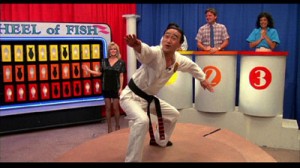 It’s the kind of movie I like to watch, perhaps because it’s the kind of movie I’d most like to make. And maybe someday, with eccentric imagination and a bit of luck, I’ll get there.
It’s the kind of movie I like to watch, perhaps because it’s the kind of movie I’d most like to make. And maybe someday, with eccentric imagination and a bit of luck, I’ll get there.
Okay guys. I’ve held out this long, but now I have to say it.
I. LOVE. THIS. MOVIE.
Tidbits:
-The UHF DVD, one of the first I ever purchased, offers an impressive assortment of bonus features, including a large number of trimmed and deleted scenes with commentary by Al himself, offering some extra insight into the film’s story and showcasing some of the “filler” Telethon acts at greater length.
-Dr. Demento, a quirky radio DJ who first gave airtime to a young Al Yankovic’s parody recordings, has a cameo in the film. He’s sitting in the crowd in a “Stanley Spadowski’s Clubhouse” promo, and Stanley sprays whipped cream into his mouth.
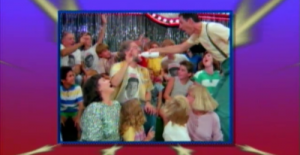 -The film was shot almost entirely in Tulsa, Oklahoma, far from the glitz of Hollywood. You may remember YouTuber and “urban explorer” AdamTheWoo from his extensive “location search” video I linked to in my Ernest Saves Christmas review. Well, he did one for UHF, too. It’s interesting to see how little remains…and yet how recognizable those remnants are.
-The film was shot almost entirely in Tulsa, Oklahoma, far from the glitz of Hollywood. You may remember YouTuber and “urban explorer” AdamTheWoo from his extensive “location search” video I linked to in my Ernest Saves Christmas review. Well, he did one for UHF, too. It’s interesting to see how little remains…and yet how recognizable those remnants are.
Finally, I present for your perusal some of my own fan projects dedicated to the movie:
—
Brian Terrill is the host of television show Count Gauntly’s Horrors from the Public Domain. You can keep up with Brian’s 100 Film Favorites countdown here.


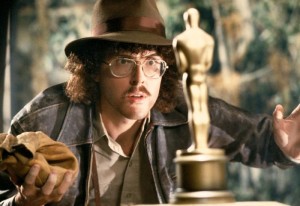
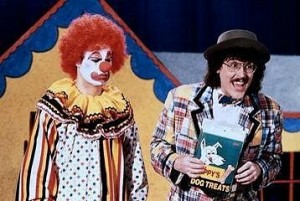
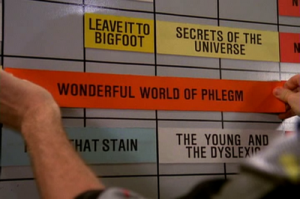
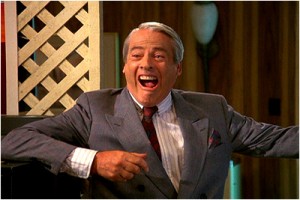
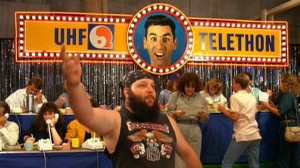
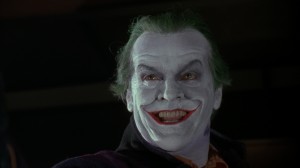
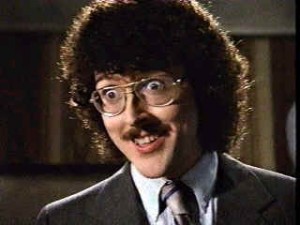
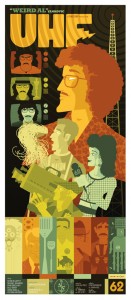
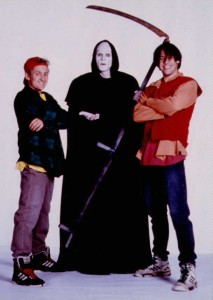
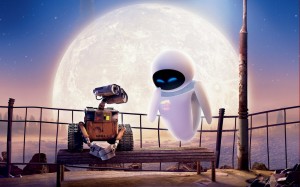
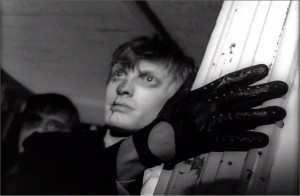
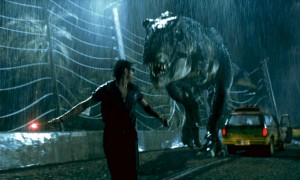



This year marks the 25th anniversary of “U.H.F.”, and the film is finally receiving the tribute it so richly deserves: a pornographic parody. I never thought I’d see the day that two very dedicated erotic actresses would don the garb of not only George and Stanley, but also Kuni, and even Emo Phillips’ mutilation-prone shop teacher.
I’m weeping tears of joy and intense arousal.
http://www.salon.com/2014/07/24/weird_al_has_finally_made_it_theres_now_a_porn_parody_of_his_work/
AND Conan the Librarian, AND Raul Hernandez. This is perhaps the least-expected thing I’ve ever seen.